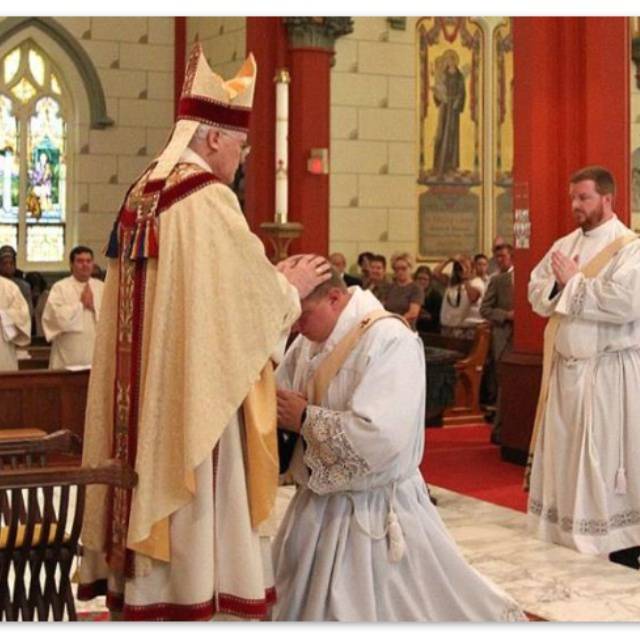"Christ gives the dignity of the royal priesthood to the people he has made his own
by laying on of hands."

Every single one of us has a special role to play in God’s plan for the salvation of all the world. We have all been given gifts and talents that are not intended only for ourselves; God always intended that those gifts be shared. Some have been called to become parents and married persons. They may also serve some role in the public sector of work, using their gifts to benefit others and give glory to God. Others are called upon to become priests or religious brothers and sisters.
Knowing God’s call in your life is a process of discernment. It can be hard to know where we are being called upon to use our gifts. Our diocese offers a website that aids in this discernment, and it can be found at dioceseoftulsa.org/vocations. For young men considering the priesthood, please contact the Diocesan Vocations Office at 918-294-1904, ext. 4936.
"There are different kinds of spiritual gifts but the same Spirit; there are different forms of service but the same Lord;
there are different workings but the same God who produces all of them in everyone." (1 Corinthians 12:4-6)
The Sacrament of Holy Orders: In Depth
“Holy Orders is the sacrament through which the mission entrusted by Christ to his apostles continues to be exercised in the Church until the end of time: thus it is the sacrament of apostolic ministry. It includes three degrees: episcopate, presbyterate, and diaconate” (Catechism of the Catholic Church, 1536).
Bishops
As successors to the apostles, bishops share fully in the three-fold apostolic mission given by Christ to his Church, namely that of teaching, sanctifying, and governing, and by ordination they are given the fullness of the sacrament of holy orders. A diocesan bishop is the chief pastor of a local church, or “diocese,” which normally consists of the faithful within a given geographical area. The Church of the Madalene is part of the Diocese of Tulsa (www.dioceseoftulsa.org), which consists, roughly, of the area of Eastern Oklahoma, and which is under the pastoral care of Most Rev. David A. Konderla, Bishop of Tulsa.
Priests
Priests are “co-workers” of the bishops insofar as their ministry depends upon the episcopal order for its exercise. Through the sacrament of holy orders, priests “are signed with a special character and so are configured to Christ the priest in such a way that they are able to act in the person of Christ the head” (Catechism of the Catholic Church, 1563).
The primary role of the priest is to offer the sacrifice of the Holy Mass and to preach the gospel of Jesus Christ. Depending upon his state in life (for example, whether a secular or religious) and particular assignment, a priest will also engage in other areas of ministry.
Deacons
Deacons are special co-workers of the bishop in his task of “diakonia” or service, and they therefore receive the sacrament of holy orders in such a way that they are specially configured to Christ the Servant. While deacons may be assigned any number of duties for the good of the local community, as with the bishop and priest their public ministry finds its pinnacle and source of strength in the Divine Liturgy of the Church, especially in the Holy Eucharist, at which they are the prime assistants of the bishop and priests. The Catechism of the Catholic Church mentions examples of other common duties of the deacon, including “...the distribution of Holy Communion..., assisting at and blessing marriages..., the proclamation of the Gospel and preaching..., presiding over funerals..., and dedicating themselves to the various ministries of charity” (Catechism of the Catholic Church, 1570). The Church of the Madalene is served by the Rev. Deacon Nelson Sousa, a deacon of the Diocese of Tulsa.
If you think that God may be calling you to a vocation as a deacon or priest, or if you would just like more information, the following links may be helpful. Information about other callings, for example to marriage or the consecrated life, is also available:
- Priesthood questions: www.dioceseoftulsa.org/vocations, for the Diocese of Tulsa
- Questions about the Diaconate: www.dioceseoftulsa.org and follow the “vocations” link
- Other information about clergy, consecrated life and vocations from the USCCB: http://usccb.org

